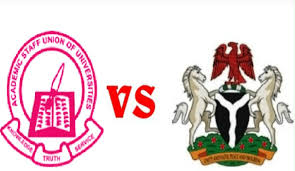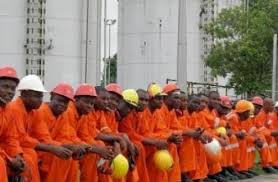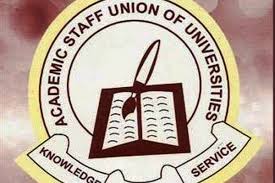Civil Society Coalition Berates FG Over Incessant ASUU Strike
A coalition of Civil Society Organizations in Nigeria has called on the Federal Government to stand up to action in saving the Education Sector in Nigeria especially by setting in motion with immediate effect , all the mechanisms necessary for meeting the funding requirements of the agreement it signed with the Academic Staff Union of Universities in 2009.
The call which was made through a release tagged ASUU STRIKE: TIME FOR THE FEDERAL GOVERNMENT TO ACT TO SAVE EDUCATION detailed the historical pattern of this Academic Strike Action to the protracted industrial unrest between 1994 and 1996 as a result of the government’s refusal to honour the terms of the FGN/ASUU agreement of September 1992.
Comparing the strike then to this one which is also as a result of Federal Government’s refusal to uphold its negotiation with ASUU in 2009, the Civil Societies stressed the greater implication of Federal Government’s failure to fulfil its part of contractual agreements on the economy and society at large.
“A government that habitually reneges on agreements freely entered into with its citizens cannot be counted upon to uphold the sanctity of contracts, treaties or agreements. Little wonder then that all the jamborees of the government in the name of attracting foreign investors end up yielding little or no result since no serious investor will invest in a country where the sanctity of agreements or contract means nothing” it stated.
Further, the Civil Societies through its release exposed the undermining role of the National Universities Commission (NUC) in this reoccurring strike action which is fast paralysing the Educational Sector. It explains that the NUC has a duty as part of its functions as stated in its enabling  act to “… prepare periodic master plans for the balanced and coordinated development of all universities in Nigeria’, ‘lay down minimum academic standards in the federal republic of Nigeria and accredit degrees and other academic awards’, ‘to ensure that quality is maintained within the academic programmes of the Nigerian university system’, ‘to advise the Federal Government on the financial needs, both recurrent and capital of university education in Nigeria…”, ‘’to undertake periodic review of the terms and conditions of service of personnel engaged in the universities and to make recommendations thereon to the Federal Government as appropriate’’.
act to “… prepare periodic master plans for the balanced and coordinated development of all universities in Nigeria’, ‘lay down minimum academic standards in the federal republic of Nigeria and accredit degrees and other academic awards’, ‘to ensure that quality is maintained within the academic programmes of the Nigerian university system’, ‘to advise the Federal Government on the financial needs, both recurrent and capital of university education in Nigeria…”, ‘’to undertake periodic review of the terms and conditions of service of personnel engaged in the universities and to make recommendations thereon to the Federal Government as appropriate’’.
“It is quite clear from the foregoing therefore, that the incessant agitation of ASUU is direct fallout of the embarrassing abdication of responsibility by the NUC. Clearly, it has not been up and doing with regards to its primary duty to the Nigerian university system. The question in view of the monumental and disastrous failure is, is there any basis for the continued existence of the NUC?”
“Incessant strikes by ASUU over the very issues that are squarely within the remit of the NUC and for which it ought to have properly advised the government on, clearly shows that the NUC has over the years failed woefully in the discharge of its primary function of ensuring standards and advising governments on the needs of the universities’’
‘’The colossal failure of NUC to perform its primary functions and save the nation the current embarrassing state of affairs in the university system that has necessitated ASUU embarking on strike is a product of NUC’s abandonment of its primary duty of regulation, ensuring standards and calling the attention of the government to the worsening decay in tertiary education in the country. As recently revealed, the NUC, which ordinarily should be focussed in regulating standards in the university system was said to be enmeshed in contract awards, management of scholarship funds and directly managing the affairs of universities in clear violation and breach of extant laws. This, to say the least, clearly explains why the NUC has failed woefully in saving the nation from its current woes through timely advice on the critical state and needs of the Nigerian university system as well making proposals on how to avert the current state of rot in the system’’ – it stated.
Sequel to this, the Civil Societies gave their recommendations that the Federal Government demonstrate the required political will to respect the terms of the agreement which it freely entered into with ASUU, Re-open the collapsed negotiations with ASUU as quickly as possible, Set in motion with immediate effect , all the mechanisms necessary for meeting the funding requirements of the FGN/ASUU agreement of 2009, stop forthwith all efforts at derailing the interventionist agencies in stabilising the Nigerian tertiary education system , Ensure that the extant laws regulating the operations of the TET Fund are respected by all and sundry including but not limited to the NUC , and to immediately ensure that the NUC and other regulatory agencies within the tertiary education sector forthwith remain and operate within the ambit of their primary functions of regulating and setting standards for the university and tertiary education system and desist from getting enmeshed in functions that are best left to the universities/tertiary institutions/other relevant agencies and outside their core mandates.
Members of this collation of Civil Societies include Zero Corruption Coalition (ZCC), Women Organisation for Gender Issue, Civil Society Legislative Advocacy Centre (CISLAC), West African Civil Society Forum (WACSOF), Publish What You Pay (PWYP) Nigeria, National Procurement Watch Platform (NPWP), Independent Service Delivery Monitoring Group (ISDMG), Network on Police Reform in Nigeria (NOPRIN), Public Interest Lawyers League, United Action for Democracy (UAD), Community Action for Popular Participation (CAPP), Citizens Centre for Integrated Development and Social Rights (CCIDESOR), Community Outreach for Development and Welfare Advocacy (CODWA), Say No Campaign Nigeria, International Press Centre (IPC), Coalition to Save Education in Nigeria (COSEG), Feed Nigeria Initiative (FENI), Greater Nigeria Movement (GNM), Ethical Computing and Cyber Research Centre and Centre for Responsible Engagement and Patriotism.




